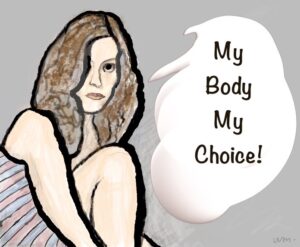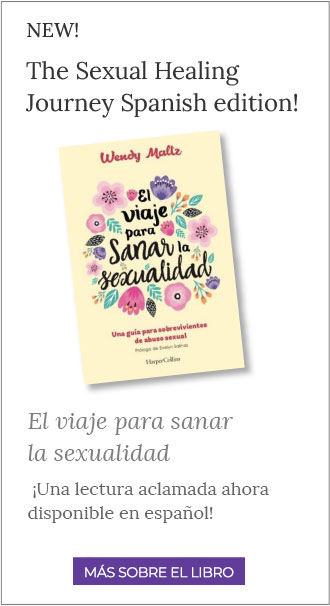“You lose,” the heckler screamed from atop the cathedral steps at the marching women. “You have no choice. Your body is mine, and you’re having my baby.” That was the scene unfolding in front of the Old St. Patrick’s Cathedral in Manhattan days after the draft of the Supreme Court decision to overturn Roe v. Wade was leaked. A man with a sneer on his face shouted over women who were protesting for the right to control their bodies; a right that had been guaranteed them half a century earlier. His energy sent chills up my spine.
His taunts reminded me of a rapist.
After forty years as a therapist working with sexual abuse survivors, and as a survivor myself, I know how sex offenders taunt, terrorize, and control their victims. The trauma and harm they inflict can persist for years, not just physically, but psychologically, socially, and sexually—impacting how we feel about ourselves and experience pleasure and intimacy with others.
Forced pregnancy is also traumatic and threatens to inflict similar damage. Like sexual abuse, it attacks a woman’s most private and personal self—her reproductive organs and sexuality—and her ability to exercise sovereignty over her own body. Abortion bans treat her as an object, not a whole person. Some new abortion restrictions are so hideously extreme they prevent women and girls from legally terminating pregnancies resulting from rape or incest, or that could cause serious health problems, or take their own lives. The removal of self-agency diminishes a person’s social standing and influence—as their personal dignity, integrity, and desires suddenly have no value.
Like sex abuse, abortion bans are not gender-neutral. A primary feature is the exercise of power and control over women and girls. New laws and restrictions target only females—and in large numbers. About one in three women have an abortion in their lifetime. One-third of teenage girls with unintended pregnancies rely on abortion to address their difficult circumstances.
Men’s reproductive rights and sexual selves are not under assault. They are not being forced into healthcare decisions against their will. Imagine the uproar if men responsible for unwanted pregnancies were required to get a vasectomy.
Not surprisingly, the most consequential actions restricting abortion rights have been spearheaded by men who appear to use the issue to gain power. Listen closely and you can hear them mask outright assaults on women through deceit and strategic manipulation. In his Supreme Court confirmation hearing (after deflecting accusations of sexual assault), Justice Brett Kavanaugh promised to honor settled law. Then, at the first opportunity, he joined conservative colleagues in overturning Roe. For years Senator Lindsay Graham claimed state governments should regulate abortions, only to abruptly switch his position and propose a national ban that would obliterate the reproductive rights of all women in America.
Perhaps the most tragic and damaging similarity between sexual abuse and abortion bans, is how victims are betrayed by other women. I’ve heard countless accounts of women aiding sex abusers by disregarding the needs of the victim, shielding the perpetrator from consequences, or even participating in the abuse. Instead of receiving support, some survivors of incest and rape are blamed for “bringing it on yourself.” Even mothers can be complicit by disbelieving a daughter’s report of sexual abuse by a family member and failing to protect her.
Women with unwanted pregnancies often endure similar victim-blaming with taunts from other women such as “You should have been more careful” and “You made your bed, now sleep in it!” Women who want abortions are called cruel names or offered unrealistic solutions, such as adoption, which many don’t want. The valid and intensely personal reasons for not wanting to continue a pregnancy are either discounted or dismissed.
The sudden loss of bodily autonomy and choice is extremely upsetting. No wonder people are protesting in the streets and at the ballot boxes. Women who assumed choice was a given, are reporting strong visceral reactions of shock, fear, anger, hurt, sadness, helplessness, and confusion.
The traumatic impact of abortion bans is felt most intensely by women who currently need an abortion and can’t get one. Like a rabbit caught in a snare, they feel trapped and experience high anxiety and depression. These feelings are compounded for women who survived sexual abuse and other traumatic events in which they experienced a loss of bodily autonomy.
Many men are also upset. They support female friends, lovers, and daughters, and realize this may be just the beginning of government control. Everyone suffers when human rights are denied.
The repercussions of forced pregnancy can affect a woman’s whole life—curtailing her educational, social, financial, and family plans. Abortion restrictions have been associated with short-term mental health problems, and other negative consequences, such as an increased likelihood of living in poverty, being tethered to an abusive partner, and developing serious medical concerns. And without safe abortion options, more women may seek unsafe abortions, a leading cause of maternal death.
In the current debate over abortion rights, these sexual trauma-related repercussions are too important to overlook.
So, what can people do to take care of themselves and fight back? I know from counseling survivors of sex abuse and other assaults on bodily autonomy that empowerment is key to recovery. Here are some suggestions for how to take back power:
Realize you are not alone. A firm majority, over sixty percent, of Americans value choice and support abortion rights. Energize yourself by joining with others to support organizations and elect lawmakers who are actively fighting for your bodily autonomy and reproductive rights.
Reject feelings of shame and blame. Be kind and caring towards yourself. You are not to blame for what’s happening. Responsibility for the present situation rests solely with judges, legislators, and others trying to impose their specific religious beliefs and prescriptions on our entire population. You are entitled to your own beliefs and decisions. You have basic rights to privacy, freedom, consent, respect, equality, sexual healthcare, and more.
Get support from sympathetic providers. If you are sexually active and at risk of unintended pregnancy, consult with medical professionals to select reliable birth control. If you currently have an unwanted pregnancy, don’t delay, seek safe, legal options for getting help. Keep at it until you get the help you need. And explore ways to maintain the privacy of your decision and keep yourself safe.
Work as a team with your partner. New restrictions stress couple relationships. Turn towards each other, affirming your rights and sharing the responsibility for obtaining and using effective birth control. Consider permanent solutions, such as tubal ligation or vasectomy, if they are appropriate and desired.
Be a survivor, not a victim. When a person is assaulted by an outside force, it’s easy to wind up identifying as a victim and sink into feeling overwhelmed, helpless, and hopeless. But the victim role is a sure dead end. It’s far better to focus on how you can survive this assault and overcome its effects.
Silence, secrecy, and shame maintain feelings of powerlessness. Now is the time to speak out, share your story, and not give up. Although it will take time to reestablish reproductive rights, positive change and healing are possible.
Sexual relations and childbearing are two of the most beautiful and rewarding experiences a woman can know in her lifetime. But these joys are only possible when a woman has ownership of her own body, feels ready, and is filled with genuine desire.
© Wendy Maltz, October 27, 2022, for HealthySex.com. Reflections on Sex, column #2. (rev. 8-14-2023)





